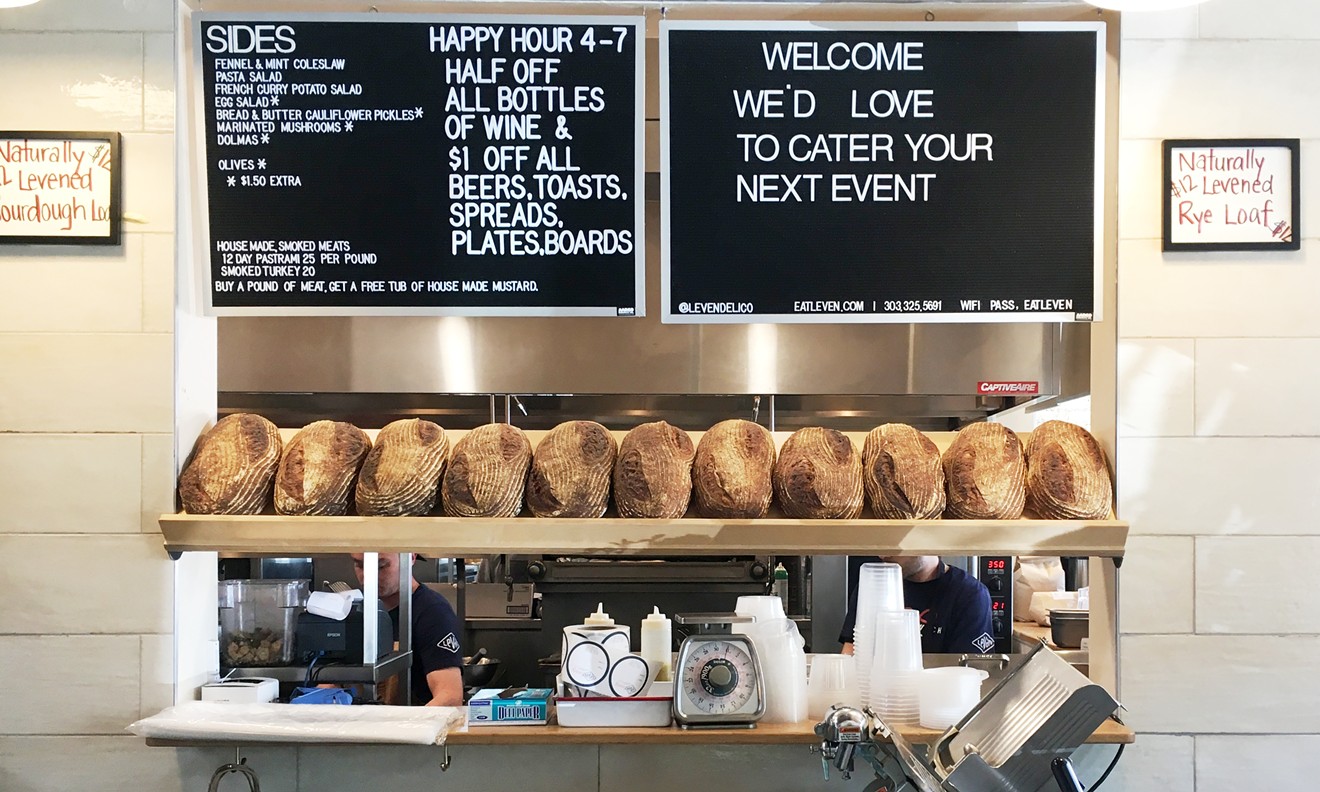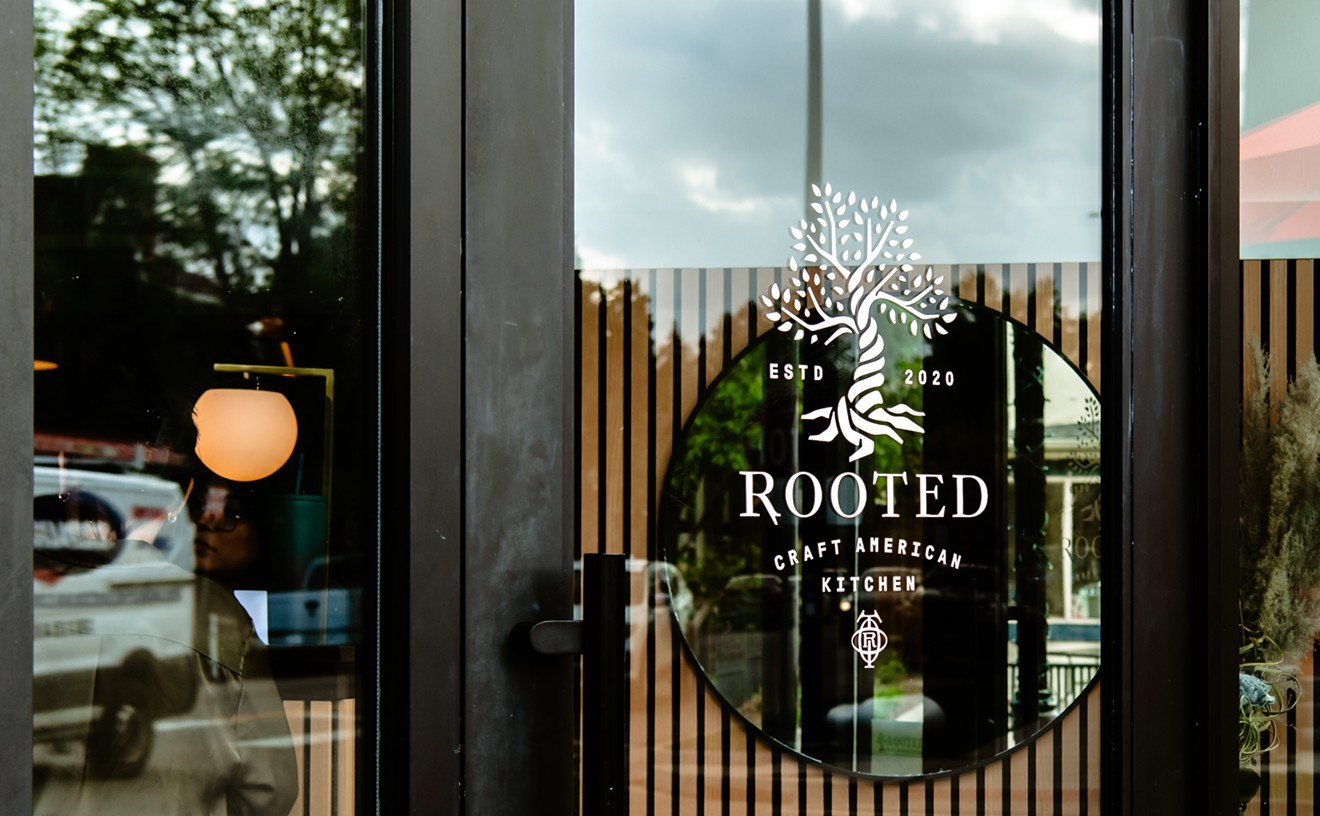The downtown breakfast and lunch crowd will remember Anderson from his Hi*Rise Bakery in the Ballpark neighborhood, which he ran for ten years before a pending rent increase persuaded him to close the place at the end of 2018. He recently signed on at Leven Deli Co. to head the Golden Triangle eatery's new bread program. At Hi*Rise, the baker specialized in yeast-risen bagels and sandwich breads, but at Leven, launched in 2018 by Anthony Lygizos and executive chef Luke Hendricks, he's focusing on naturally leavened rye, sourdough and flatbread, on which Hendricks piles his house-smoked pastrami and turkey, among other classic deli options.
When Anderson joined the Leven team in April, he found a sourdough starter already bubbling away, left by outgoing chef Sung Choi (who departed to open Little Beast Street Food on East Colfax Avenue). A sourdough starter comes to life after combining nothing but flour and water and letting natural yeast and bacteria (present in the flour and the air) feed on the carbohydrates. The leaven (as it's sometimes called) must be divided and fed more flour and water daily in a commercial bakery to keep the culture active, healthy and, most important, tasty.
"Our leaven gets fed twice a day," Anderson explains. "In general, it's predictable, but each day is a little different."
Store-bought yeast has been perfected over decades to give a fast, surefire rise, even if the resulting flavor can be a little bland (pros coax out more flavor using a slow, low-temperature rise). The ratio of yeast to flour and water is set, so a baker just mixes everything together and ends up with a consistent product in a relatively short amount of time. Naturally leavened bread is finicky and more susceptible to temperature and humidity conditions, but it also carries a much more complex range of flavors, with the tangy flavor of sourdough the most well known. "We were looking for what chef [Hendricks] calls 'the funk' — as rich and complex as possible," Anderson says. "What I concentrate on is time and flavor."
Every morning, Anderson arrives at the deli at 5 a.m. (not particularly early for a professional baker, he admits, but he's a morning person, so it's never a chore) and begins the 36-hour process of building a small amount of leaven into nearly twenty three-pound loaves baked daily, five or six days a week. The rye bread is a blend of 20 percent rye flour and 80 percent wheat, with a bold flavor of caraway permeating the airy but toothsome crumb. The baker adds caraway directly to the leaven before he even starts making the dough, so the flavor of the seeds intensifies over the day and a half before the bread is baked.

The rye bread (sliced by the author, not by Leven Deli) is sprinkled with caraway seeds.
Mark Antonation
"The best part about having the bakery inside the deli is this relationship," says Hendricks, pointing back and forth between himself and Anderson, "where we get to talk about bread every day."
Anderson agrees, adding that Hendricks's pastrami was the selling point that lured him into the job. "Just think: smoked meats and naturally leavened bread and a full sandwich deli all in one place," he says with pride, pointing out that he can't think of another place in town that does all three.
In addition to the daily breads, Anderson bakes other styles from his repertoire for weekly specials; recently he made torta rolls to carry Hendricks's chile-braised beef, and Sicilian baguettes for meatball subs. Leven also turns out brownies and three kinds of cookies daily, and Anderson is planning macaroons to go along with the Monet exhibit coming soon to the nearby Denver Art Museum (because the coconut cookies mimic the French impressionist's famed haystacks).
Baking bread is a meditative and often lonely endeavor. "Every half-hour, I know exactly what I'm going to be doing. It's a real process, but it's all built around what the dough needs," Anderson explains. But he also admits that he's an extrovert and needs interaction with fellow employees and customers to get him through the day, so he's often found making the rounds in the dining room, busing tables or making sure guests are enjoying their sandwiches. He might even ask if you want a loaf to take home (they're $12 each, or $6 for a half-loaf).
Just make sure your conversation lasts less than half an hour; Anderson has a standing date with some dough.
Leven Deli Co. is located at 123 West 12th Avenue and is open daily from 11 a.m. to 7 p.m. Call 303-325-5691 or visit eatleven.com for more details.














